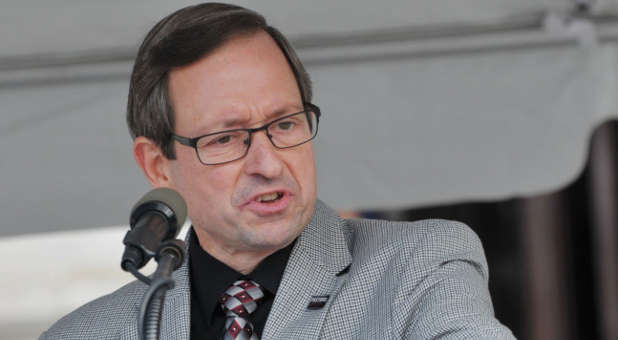How Should Pastors Respond to the Unrest in America?
The Charlottesville, Virginia, area is still working to heal after a racially charged and violent protest where one woman was killed more than a week ago. That eruption caused other cities to consider removing statues, monuments and other pieces of history that may cause conflict.
The American Pastors Network (APN) has been paying close attention to these unsettling events around the nation and praying about how APN state chapters can provide a positive presence.
APN President Sam Rohrer says that leaders for the newly organized Virginia Pastors Network (VAPN) have worked to serve as intermediaries during this tumultuous time. Likewise, leaders for the North Carolina Pastors Network (NCPN) have also been impacted, after Duke University recently removed a vandalized statue of Gen. Robert E. Lee from the front of Duke’s chapel in Durham, N.C.
“Pastors and churches simply must serve as peaceful and grounded voices of reason in these turbulent times,” Rohrer said. “Both Christians and those who may be far from God will look to the church for its response about ways we can come together to begin the healing process in our fractured communities. It is a critical time for churches to come together and for pastors to stand for truth.”
Rohrer added that every memorial holds a powerful teaching moment for children and young Americans. When they ask, “What is this?” and “Why is this here?” it is an opportunity to recognize how the sinfulness of mankind always produces a tension between human beings.
“It is the ideal time to teach how—through Jesus Christ the Redeemer of mankind—all people, regardless of color, nationality or station in life, can realize their intrinsic value before God,” Rohrer said. “Isn’t this the ideal time to demonstrate that no one race, color or people group has any singular claim to truth? Isn’t this the very time to teach that unity is achieved at the foot of the cross when we agree with God about Jesus Christ and that He alone is the way, the truth and the life?
“So what should we be asking?” he continued. “Why do we have memorials? Why must we oppose their removal? Mustn’t we take a deep breath—everyone—and ask for God’s guidance at this time? What does God say about memorials? What must we as Christian citizens do if this mindless dash to destruction is to be stopped? As we look back, what perhaps have we as Christians done to prepare our culture for such a dangerous time? Memorials, when erected by the support of the people or culture at any given point in time and out of respect for those people in that time, should remain. To attack a legitimately erected memorial is to attack our fathers and grandfathers and to say that we know better today than anyone before us thought was worthy.”
Facing conflict in its state, leaders for the Virginia Pastors Network are aware of the great duty to help unite Virginia’s people—both inside and outside the church—in times of unrest and uncertainty.
“It is important for Christians to be leaders, not only in helping stabilize unrest in society, but in shaping society as a whole—to reflect godliness as a culture,” said VAPN President Steven Harrelson. “Our nation today is very reactive and volatile. Christian leaders have the responsibility to speak truth boldly and in love. I am convinced that the one thing that will unite men and women of every color is Jesus Christ—the One who loves and died for all mankind without prejudice. Bible-believing Christians have been divided on matters of color for long enough, and it is time to stand and show the world what Jesus meant when He said, ‘Love one another as I have loved you.'”
As other cities and states consider the removal of what may be viewed as controversial or offensive, NCPN President Dave Kistler, also a co-host on APN’s “Stand in the Gap Today” radio ministry, said that while healing and reconciliation are needed, scrubbing history is not the answer.
“What is so disturbing about the Duke decision, as well as all other removal decisions across the nation, is that it is all being done based on flawed thinking,” Kistler said on a recent “Stand in the Gap Today” radio broadcast. “First, it is being done based on political correctness. In an effort to be more socially accepted, we are throwing away the very history of our nation. Additionally, the attempt to connect the multiplicity of confederate statues across the land to their erector’s racist motivations is a brazen stretch. Acknowledgment of one’s history is not equal to approval of the same. What will be offered next on the altar of political correctness?” {eoa}
APN offers the daily radio ministry, “Stand in the Gap Today,” co-hosted by Rohrer, Kistler and Gary Dull, executive director of the Pennsylvania Pastors Network (PPN). Find a station here or listen online at AmericanPastorsNetwork.net by clicking on the orange “Listen Live” button on the right-hand side of the website daily at noon ET. Read more about the American Pastors Network and its “Stand in the Gap” radio ministry here.















































